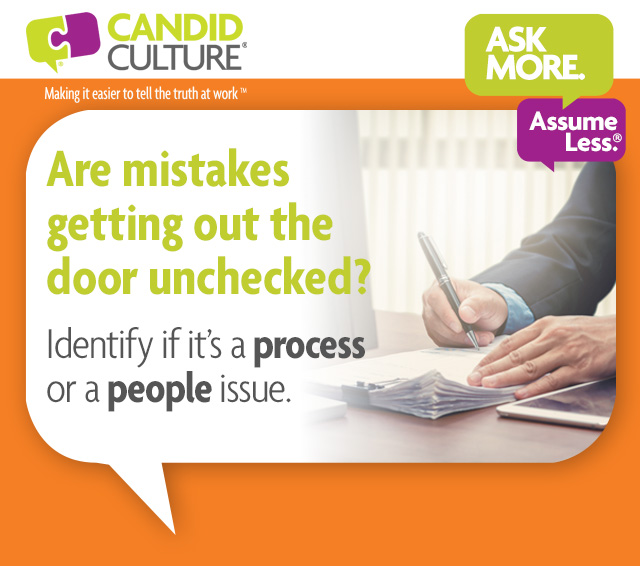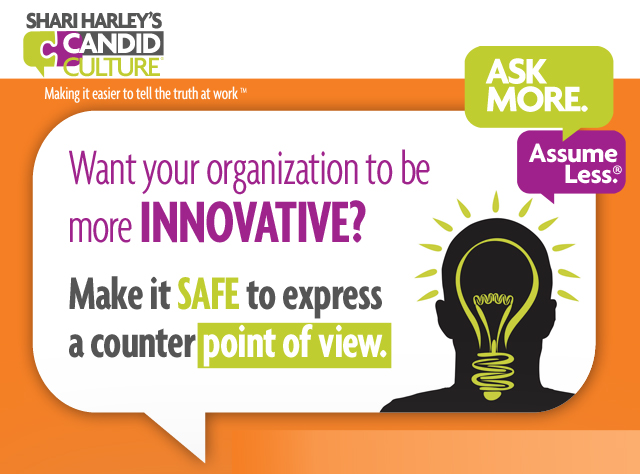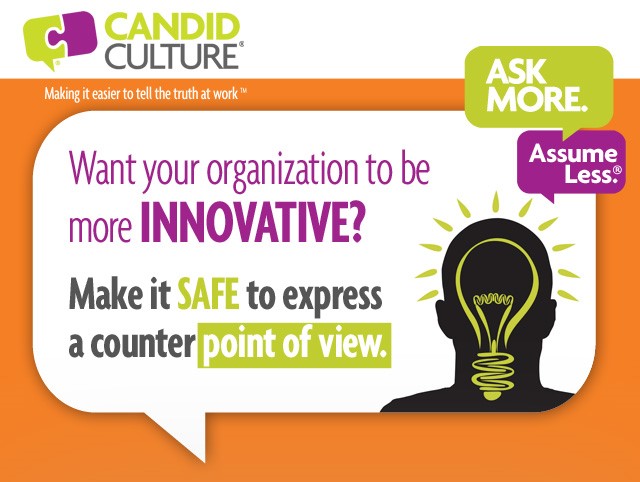Posts Tagged ‘Innovation In the Workplace’
It’s not unusual to ask who is at fault when mistakes in an organization are made. We want to know who was to blame. Before asking who is accountable for a mistake, I’d ask what lead to the mistake. Was the error a people or a process issue?
If a document with mistakes is shared with people outside of an organization, there is a process issue.
Yes, someone made a mistake. Someone wasn’t careful or knowledgeable enough to catch the error. But if a document’s accuracy is important, more than one person should be looking at that document before it leaves the organization. When only one person looks at an important document, there is a process issue.
Processes include: The practices followed and the tools used when creating, proofreading, saving, and storing work.

William Ury, author of the negotiation books Getting to Yes and Getting Past No, said, “Be easy on the people and hard on the process.” When mistakes happen, evaluate the processes surrounding that work. What allowed the mistake to go out the door unchecked? Would a different process with more checks and balances and more eyes on the work have prevented the error?
After evaluating the processes or lack thereof, coach the person who made the mistake. Fill the gap that allowed the mistake to happen, but first, evaluate your processes.

You’ve either seen the video or heard about the group think that happened before NASA’s Challenger exploded in 1986. One engineer felt strongly that there was a defect in the Challenger’s design. He spoke up, others disagreed. He continued to speak up, until it became very uncomfortable to do so.
Most employees don’t even get that far. Many employees are afraid to speak up at all, feeling that it’s not ok to have a counter point of view, and that those who disagree with ‘management’ are eventually fired. I honestly am not sure where this comes from. It hasn’t been my experience, and yet the fear of speaking up is pervasive. I hear it in almost every organization with which I work.

If it’s not ok to express different opinions, your organization will deliver the same-old products and services you always have. If staying the same works in your industry, great. But stagnation is detrimental to most organizations.
If you want more innovation in the workplace, you have to make it safe to speak up and offer a different point of view. Saying new, different, and even controversial things must be encourage and rewarded.
Five Ways to Encourage Innovation In the Workplace:
- Ask for new ideas and different points of view.
- Wait until you get both. Don’t allow a meeting or discussion to move on until you get new, opposing, and different points of view.
- Positively acknowledge people who risk and say something new or different from the norm.
- Ensure people with new ideas and different points of view are allowed to finish speaking before they’re interrupted or before someone else tries to negate their ideas.
- Create a few new awards in your organization and announce winners publicly and with great fanfare. You get what you reward.
Create Awards to Encourage Innovation In the Workplace:
- Acknowledge the person who fails massively trying something new.
- Award the person who brings new ideas to the table, regardless of what happens to those ideas.
- Celebrate the person who willingly gives you the worst news.
The fear of speaking up and saying something new or different will destroy your innovation efforts. It will also squelch your employees’ ambition and ability to be creative. Make it safe to tell the truth, even when the truth is hard to understand or unpopular, and see what happens to innovation, creativity, and employee productivity and morale.

 You’ve either seen the video or heard about the group think that happened before NASA’s Challenger exploded in 1986. One engineer felt strongly that there was a defect in the Challenger’s design. He spoke up, others disagreed. He continued to speak up, until it became very uncomfortable to do so.
You’ve either seen the video or heard about the group think that happened before NASA’s Challenger exploded in 1986. One engineer felt strongly that there was a defect in the Challenger’s design. He spoke up, others disagreed. He continued to speak up, until it became very uncomfortable to do so.
Most employees don’t even get that far. Many employees are afraid to speak up at all, feeling that it’s not ok to have a counter point of view, and that those who disagree with ‘management’ are eventually fired. I honestly am not sure where this comes from. It hasn’t been my experience, and yet the fear of speaking up is pervasive. I hear it in almost every organization with which I work.
If it’s not ok to express different opinions, your organization will deliver the same-old products and services you always have. If staying the same works in your industry, great. But stagnation is a killer to most organizations.
If you want more innovation in the workplace, you have to make it safe to speak up and offer a different point of view. Saying new, different, and even controversial things must be encourage and rewarded.
Five Ways to Encourage Innovation In the Workplace:
- Ask for new ideas and different points of view.
- Wait until you get both. Don’t allow a meeting or discussion to move on until you get new, opposing, and different points of view.
- Positively acknowledge people who risk and say something new or different from the norm.
- Ensure people with new ideas and different points of view are allowed to finish speaking before they’re interrupted or before someone else tries to negate their ideas.
- Create a few new awards in your organization and announce winners publicly and with great fanfare. You get what you reward.
Create Awards to Encourage Innovation In the Workplace:
- Acknowledge the person who fails massively trying something new.
- Award the person who brings new ideas to the table, regardless of what happens to those ideas.
- Celebrate the person who willingly gives you the worst news.
The fear of speaking up and saying something new or different will kill your innovation efforts. It will also kill your employees’ ambition and ability to be creative. Make it safe to tell the truth, even when the truth is hard to understand or unpopular, and see what happens to innovation, creativity, and employee productivity and morale.


People like certainty. We feel more comfortable knowing than not knowing. Not having an answer is uncomfortable. And looking for answers requires work. But sometimes knowledge is the enemy and the death to innovation in the workplace. If we know how something or someone is, there isn’t much of a reason to look for different and possibly better answers. But sometimes we don’t know what we don’t know.
Companies want to be innovative, creative and agile. And that’s good. A lack of innovation is surely the route to long-term failure. For example, a company is at the top of its game. It sells a product that is better than everyone else’s and becomes complacent. Relying on its past success, the successful company creates nothing new for five years, while up-and-comers are creating better solutions. Before they know it, the successful company is obsolete.
On a smaller scale, but equally damaging to innovation in the workplace, is hiring and retaining employees who don’t regularly ask the questions:
- Why do we do this this way?
- Is there a better way to do this?
- What don’t we know that we don’t know?
If you want innovation in the workplace, you need to hire people who are curious and think critically.
People who are curious and think critically have a few key qualities. Curious and critical thinkers are:
- Secure
- Self-confident
- Coachable
- Not afraid to ask questions
- Not afraid to be wrong
Identifying these qualities in candidates is challenging. I’ve interviewed and hired many people who seemed quite self-confident and coachable during the interview process, but once they began working, it quickly became apparent that they were neither. If you want people who will execute an existing process that works, non-critical thinkers are effective employees. If you want people who will consistently challenge the status quo, you should let insecure and people lacking curiosity go, as soon as you see the signs.
If you want innovation in the workplace and want your organization to stay current and competitive you need to have employees who aren’t afraid to consistently ask the question “why. Incorporate status-quo busting questions into your meetings. Create rewards and recognize people who risk trying to fix a problem or create something new.
Train employees to ask these questions:
- Why do we do things this way?
- Why did this happen?
- What questions have we not asked?
- What would happen if we did _______?
As always, you get what you ask for. What are you asking for?

 You’ve either seen the video or heard about the group think that happened before NASA’s Challenger exploded in 1986. One engineer felt strongly that there was a defect in the Challenger’s design. He spoke up, others disagreed. He continued to speak up, until it became very uncomfortable to do so.
You’ve either seen the video or heard about the group think that happened before NASA’s Challenger exploded in 1986. One engineer felt strongly that there was a defect in the Challenger’s design. He spoke up, others disagreed. He continued to speak up, until it became very uncomfortable to do so.
Most employees don’t even get that far. Many employees are afraid to speak up at all, feeling that it’s not ok to have a counter point of view, and that those who disagree with ‘management’ are eventually fired. I honestly am not sure where this comes from. It hasn’t been my experience, and yet the fear of speaking up is pervasive. I hear it in almost every organization with which I work.
If it’s not ok to express different opinions, your organization will deliver the same-old products and services you always have. If staying the same works in your industry, great. But stagnation is a killer to most organizations.
If you want more innovation in the workplace, you have to make it safe to speak up and offer a different point of view. Saying new, different, and even controversial things must be encourage and rewarded.
Five Ways to Encourage Innovation In the Workplace:
- Ask for new ideas and different points of view.
- Wait until you get both. Don’t allow a meeting or discussion to move on until you get new, opposing, and different points of view.
- Positively acknowledge people who risk and say something new or different from the norm.
- Ensure people with new ideas and different points of view are allowed to finish speaking before they’re interrupted or before someone else tries to negate their ideas.
- Create a few new awards in your organization and announce winners publicly and with great fanfare. You get what you reward.
Create Awards to Encourage Innovation In the Workplace:
- Acknowledge the person who fails massively trying something new.
- Award the person who brings new ideas to the table, regardless of what happens to those ideas.
- Celebrate the person who willingly gives you the worst news.
The fear of speaking up and saying something new or different will kill your innovation efforts. It will also kill your employees’ ambition and ability to be creative. Make it safe to tell the truth, even when the truth is hard to understand or unpopular, and see what happens to innovation, creativity, and employee productivity and morale.







 You’ve either seen
You’ve either seen 


